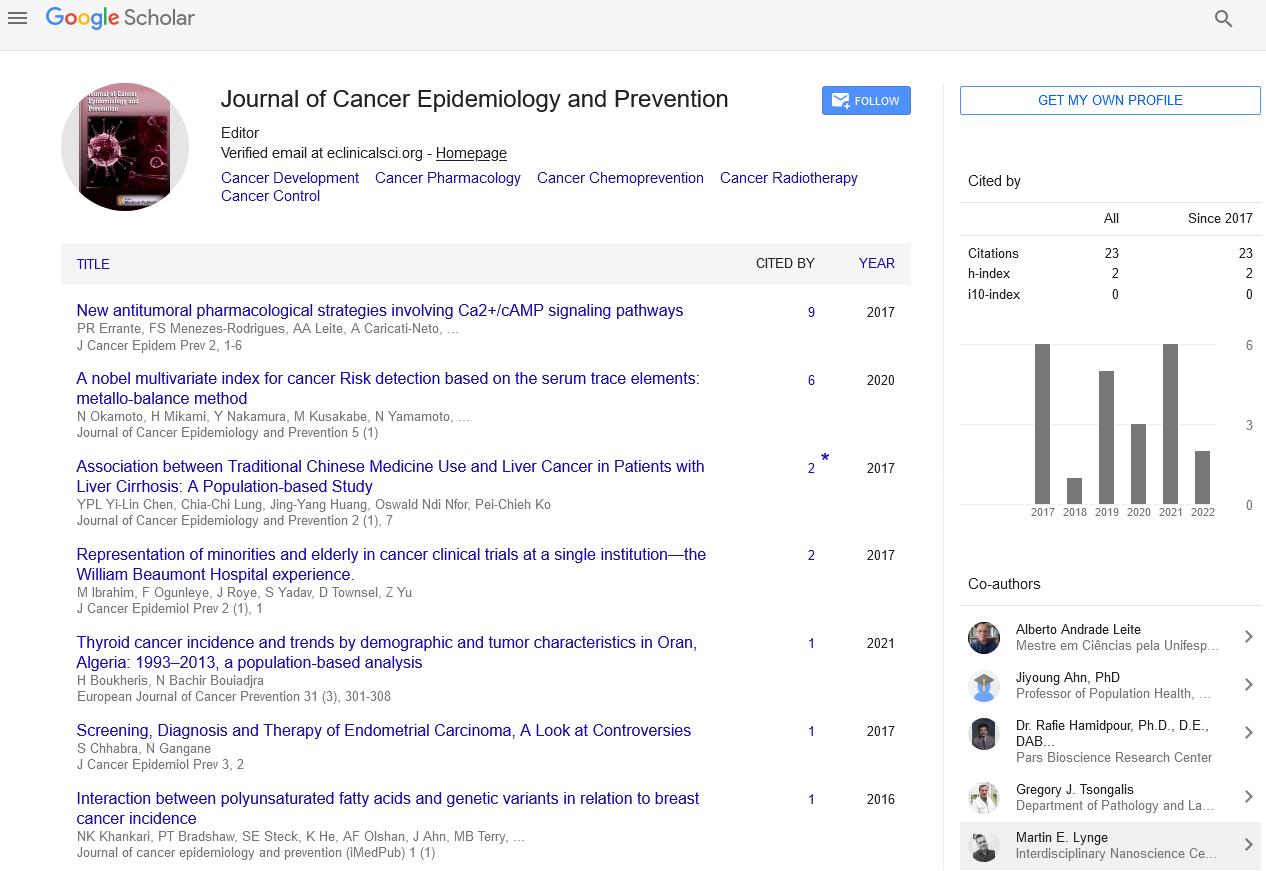Short Communication - (2024) Volume 9, Issue 1
Hormone Therapy in Cancer Treatment: Targeting Hormone-Sensitive Tumors for Improved Outcomes.
Serous Mikk*
Department of Pharmaceutical Sciences, University of Waterloo, Canada
*Correspondence:
Serous Mikk,
Department of Pharmaceutical Sciences, University of Waterloo,
Canada,
Email:
Received: 28-Mar-2024, Manuscript No. IPJCEP-24-19748;
Editor assigned: 01-Mar-2024, Pre QC No. IPJCEP-24-19748 (PQ);
Reviewed: 15-Mar-2024, QC No. IPJCEP-24-19748;
Revised: 20-Mar-2024, Manuscript No. IPJCEP-24-19748 (R);
Published:
27-Mar-2024, DOI: 10.36648/IPJCEP.24.09.06
Introduction
Hormone therapy, also known as endocrine therapy, is a targeted
treatment approach that aims to inhibit the growth and spread
of hormone-sensitive tumors by altering hormone levels or
blocking hormone receptors. Hormone-sensitive tumors, such
as certain types of breast, prostate, and ovarian cancer, rely
on hormones like estrogen, progesterone, or testosterone to
grow and proliferate. Hormone therapy disrupts this signalling
pathway, thereby slowing down or inhibiting tumor growth. In
this article, we will explore the principles of hormone therapy,
its applications in cancer treatment, and its role in improving
patient outcomes.
Description
Understanding Hormone Therapy: Hormone therapy interferes
with the hormonal signalling pathways that drive the growth of
hormone-sensitive tumors. There are several mechanisms by
which hormone therapy can be employed: Hormone Receptor
Blockade: Hormone-sensitive tumors express specific hormone
receptors on their surface, such as estrogen receptors (ER) in
breast cancer or androgen receptors (AR) in prostate cancer.
Hormone receptor blockade involves using medications, such as
selective estrogen receptor modulators (SERMs) or aromatase
inhibitors, to block these receptors and prevent hormone
binding. Hormone Synthesis Inhibition: Some hormonesensitive
tumors, such as certain types of breast and prostate
cancer, rely on the body’s natural synthesis of hormones for
growth. Hormone synthesis inhibitors, such as aromatase
inhibitors or gonadotropin-releasing hormone (GnRH)
agonists, suppress the production of hormones like estrogen or
testosterone. Hormone Replacement Therapy (HRT): In certain
cases, hormone replacement therapy may be used to restore
hormonal balance in hormone-deficient individuals. However,
in patients with hormone-sensitive tumors, HRT is typically
avoided to prevent tumor growth. Applications of Hormone
Therapy in Cancer Treatment: Hormone therapy is widely
used in the treatment of hormone-sensitive tumors, either as
a primary treatment modality or in combination with other
treatments such as surgery, chemotherapy, or radiation therapy.
Some common applications of hormone therapy include:
Breast Cancer: Hormone receptor-positive breast cancer:
Hormone therapy is a standard treatment option for estrogen
receptor-positive (ER+) and/or progesterone receptor-positive
(PR+) breast cancer. Medications such as tamoxifen, aromatase
inhibitors (e.g., anastrozole, letrozole), and selective estrogen
receptor degraders (SERDs) (e.g., fulvestrant) are commonly
used. Preoperative (neoadjuvant) hormone therapy: Hormone
therapy may be used before surgery to shrink the tumor and
improve surgical outcomes in certain cases. Prostate Cancer:
Androgen deprivation therapy (ADT): Androgen deprivation
therapy is the mainstay of treatment for advanced or
metastatic prostate cancer. It aims to lower testosterone levels
or block androgen receptors, slowing down tumor growth and
alleviating symptoms. Combined androgen blockade: In some
cases, ADT may be combined with other medications, such as
anti-androgens or GnRH agonists, to achieve maximal androgen
blockade. Ovarian Cancer: Hormone receptor-positive ovarian
cancer: Hormone therapy may be considered as a treatment
option for a subset of ovarian cancers that express hormone
receptors. However, its efficacy in ovarian cancer remains
under investigation, and it is typically used in combination
with other treatment modalities. Improving Patient Outcomes:
Hormone therapy has revolutionized the treatment landscape
for hormone-sensitive tumors, offering effective and welltolerated
treatment options with fewer side effects compared
to traditional cytotoxic chemotherapy. Some key benefits
of hormone therapy include: Targeted Treatment: Hormone
therapy specifically targets hormone-sensitive tumors,
sparing healthy tissues and minimizing systemic side effects.
Prolonged Disease Control: Hormone therapy can effectively
control tumor growth and metastasis, leading to prolonged disease stabilization and improved quality of life for patients
with hormone-sensitive tumors. Adjuvant and Maintenance
Therapy: Hormone therapy is often used as adjuvant therapy
after primary treatment (e.g., surgery or radiation therapy) to
reduce the risk of cancer recurrence. Additionally, maintenance
hormone therapy may be continued for an extended period to
prevent disease progression in metastatic settings [1-4].
Conclusion
Hormone therapy has emerged as a cornerstone in the
treatment of hormone-sensitive tumors, offering targeted
and effective treatment options with favourable outcomes
for patients. By disrupting hormonal signalling pathways
critical for tumor growth and proliferation, hormone therapy
has revolutionized cancer treatment and improved survival
rates for individuals with hormone-sensitive breast, prostate,
and ovarian cancer. Continued research and advancements
in hormone therapy techniques hold promise for further
optimizing treatment outcomes and expanding the utility of
hormone therapy in cancer care.
Acknowledgement
None.
Conflict Of Interest
The author’s declared that they have no conflict of interest.
References
- Wang J (2018) Tumor microenvironment: Recent advances in various cancer treatments. Eur Rev Med Pharmacol Sci 22(12): 3855-3864.
[Crossref] [Google Scholar] [PubMed]
- Graham TA (2017) Measuring cancer evolution from the genome. J Pathol 241(2): 183-191.
[Crossref] [Google Scholar] [PubMed]
- Mullard A (2020) Addressing cancer's grand challenges. Nat Rev Drug Discov 19(12): 825-826.
[Crossref] [Google Scholar] [PubMed]
- Lorenzo AM (2014) Early epigenetic cancer decisions. Biol chem 395(11): 1315-20.
Citation: Mikk S (2024) Hormone Therapy in Cancer Treatment: Targeting Hormone-sensitive Tumors for Improved Outcomes. J Cancer Epidemiol. 9:06.
Copyright: © 2024 Mikk S. This is an open-access article distributed under the terms of the Creative Commons Attribution License, which permits unrestricted use, distribution, and reproduction in any medium, provided the original author and source are credited.

